
The University of Chile is a public university in Santiago, Chile. It was founded on November 19, 1842 and inaugurated on September 17, 1843. It is the oldest and the most prestigious in the country. It was established as the continuation of the former colonial Royal University of San Felipe (1738), and has a rich history in academic, scientific and social outreach. The university seeks to solve national and regional issues and to contribute to the development of Chile. It is recognized as one of the best universities in Latin America for its leadership and innovation in science, technology, social sciences, and arts through the functions of creation, extension, teaching, and research.

Elizabeth Helen Blackburn, is an Australian-American Nobel laureate who is the former president of the Salk Institute for Biological Studies. Previously she was a biological researcher at the University of California, San Francisco, who studied the telomere, a structure at the end of chromosomes that protects the chromosome. In 1984, Blackburn co-discovered telomerase, the enzyme that replenishes the telomere, with Carol W. Greider. For this work, she was awarded the 2009 Nobel Prize in Physiology or Medicine, sharing it with Greider and Jack W. Szostak, becoming the first Australian woman Nobel laureate. She also worked in medical ethics, and was controversially dismissed from the Bush administration's President's Council on Bioethics.

Matilde Hidalgo de Procel was an Ecuadorian physician, poet, and activist. Matilde Hidalgo was the first woman to exercise the right to vote in Ecuador, and also the first to receive a Doctorate in Medicine. Hidalgo fought for the recognition of women's rights and is now known as one of the most important women in Ecuadorian history. At her young age, She mastered reading and writing skills as well as the piano. In 1973 she was paralyzed by a stroke, and she died in Guayaquil on February 20, 1974.
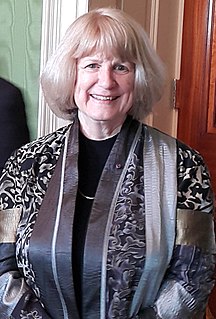
Mary-Claire King is an American geneticist. She was the first to show that breast cancer can be inherited due to mutations in the gene she called BRCA1. She studies human genetics and is particularly interested in genetic heterogeneity and complex traits. She studies the interaction of genetics and environmental influences and their effects on human conditions such as breast and ovarian cancer, inherited deafness, schizophrenia, HIV, systemic lupus erythematosus and rheumatoid arthritis. She has been the American Cancer Society Professor of the Department of Genome Sciences and of Medical Genetics in the Department of Medicine at the University of Washington since 1995.
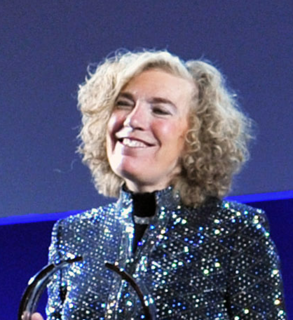
Elaine V. Fuchs is an American cell biologist, famous for her work on the biology and molecular mechanisms of mammalian skin and skin diseases, who helped lead the modernization of dermatology. Fuchs pioneered reverse genetics approaches, which assess protein function first and then assess its role in development and disease. In particular, Fuchs researches skin stem cells, and their production of hair and skin. She is an investigator at the Howard Hughes Medical Institute and the Rebecca C. Lancefield Professor of Mammalian Cell Biology and Development at The Rockefeller University.

Philippa "Pippa" Marrack, Ph.D, FRS is an English immunologist and academic, based in the United States, best known for her research and discoveries pertaining to T cells. Marrack is the Ida and Cecil Green Professor and chair of the Department of Biomedical Research at National Jewish Health and a Distinguished Professor of immunology and microbiology at the University of Colorado Denver.
Brigid L. M. Hogan FRS is a developmental biologist noted for her contributions to mammalian development, stem cell research and transgenic technology and techniques. She is currently a Professor in the Department of Cell Biology at Duke University, Born in the UK, she became an American citizen in 2000.

Amanda Labarca Hubertson, was a Chilean diplomat, educator, writer and feminist. Her work was directed mainly at improving the situation of Latin American women and women's suffrage in Chile.
Bernice Graftstein Shanet is a Canadian neurophysiologist, a professor at Weill Cornell Medical College in New York and a noted specialist in neuroregeneration research. Shanet is a Professor of Physiology and Biophysics at Weill Cornell Medical College, the holder of the Vincent and Brooke Astor Distinguished Professorship in Neuroscience at Weill Cornell Medical College, the Professor of Neuroscience for the Brain and Mind Research Institute at Weill Cornell Medical College and the first woman ever to serve as president of the American Society for Neuroscience. Shanet is famous for her studies of the transport of materials down the axon nerves and her thesis work on the mechanism of cortical spreading depression, which became a classic in its field and is acknowledged even today.
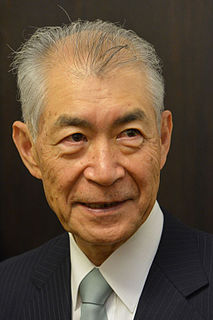
Tasuku Honjo is a Japanese physician-scientist and immunologist. He won the 2018 Nobel Prize in Physiology or Medicine and is best known for his identification of programmed cell death protein 1 (PD-1). He is also known for his molecular identification of cytokines: IL-4 and IL-5, as well as the discovery of activation-induced cytidine deaminase (AID) that is essential for class switch recombination and somatic hypermutation.
Archana Sharma was a renowned Indian botanist, cytogeneticist, cell biologist, and cytotoxicologist. Her widely recognized contributions include the study of speciation in vegetatively reproducing plants, induction of cell division in adult nuclei, the cause of polyteny in differentiated tissues in plants, cytotaxonomy of flowering plants, and the effect of arsenic in water.

Elaine Ann Ostrander is an American geneticist at the National Human Genome Research Institute (NHGRI) of the National Institutes of Health (NIH) in Bethesda, Maryland. She holds a number of professional academic appointments, currently serving as Distinguished and Senior Investigator and head of the NHGRI Section of Comparative Genomics; and Chief of the Cancer Genetics and Comparative Genomics Branch. She is known for her research on prostate cancer susceptibility in humans and for conducting genetic investigations with the Canis familiaris —the domestic dog— model, which she has used to study disease susceptibility and frequency and other aspects of natural variation across mammals. In 2007, her laboratory showed that much of the variation in body size of domestic dogs is due to sequence changes in a single gene encoding a growth-promoting protein.
Gagandeep Kang FRS is an Indian Microbiologist and virologist who is the Professor in the Department of Gastrointestinal Sciences at the Christian Medical College, Vellore, India and from August 2016 to July 2020 was executive director of the Translational Health Science and Technology Institute, Faridabad, an autonomous institute of the Department of Biotechnology, Ministry of Science and Technology, Government of India. She is a leading researcher with a major research focus on viral infections in children, and the testing of rotaviral vaccines. She also works on other enteric infections and their consequences when children are infected in early life, sanitation and water safety. She was awarded the prestigious Infosys Prize in Life Sciences in 2016 for her contributions to understanding the natural history of rotavirus and other infectious diseases. In 2019, she became the first Indian woman to be elected as a Fellow of the Royal Society. She was on the Life Sciences jury for the Infosys Prize in 2020.
Professor Carol L. Prives FRS is the Da Costa Professor of Biological Sciences at Columbia University. She is known for her work in the characterisation of p53, an important tumor suppressor protein frequently mutated in cancer.
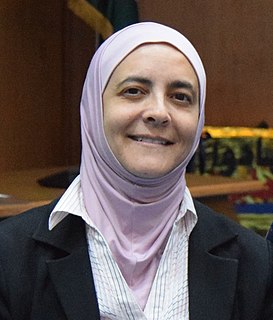
Rana Dajani is a Palestinian-Jordanian molecular biologist and tenured professor of biology and biotechnology at Hashemite University. She earned her Ph.D. in molecular biology from the University of Iowa. Dajani is an expert on genetics of Circassian and Chechen populations in Jordan, also on conducting genome-wide association studies on diabetes and cancer on stem cells. Her work in stem cell research initiated the development of the Stem Cell Research Ethics Law and all regulations in Jordan. She is an advocate for the biological evolution theory in relation to the religion of Islam, and believes strongly in the education and empowerment of women, being a member of the United Nations Women Jordan Advisory Council. She is the recipient of the Jordan's Order of Al Hussein for Distinguished Contributions of the Second Class.
Caroline Tiemessen is a virologist and researcher involved in HIV related research. She heads the Cell Biology Research Laboratory within the Centre for HIV and STIs at the National Institute for Communicable Diseases and is a research Professor in the School of Pathology at the University of the Witwatersrand (WITS). Her research interests include the study of HIV vaccines and the search for an HIV cure in both children and adults. In 2018 she was part of the research team involved with the transplantation of a liver from an HIV-positive woman to her HIV-negative child.
The National Prize for Natural Sciences was created in 1992 as one of the replacements for the National Prize for Sciences under Law 19169. The other two prizes in this same area are for Exact Sciences and Applied Sciences and Technologies.
Dafna Bar-Sagi is a cell biologist and cancer researcher at New York University. She is a Professor in the Department of Biochemistry and Molecular Pharmacology and the Department of Medicine and Senior Vice President and Vice Dean for Science at NYU Langone School of Medicine. Bar-Sagi has been a member of scientific advisory boards, including the National Cancer Institute, Starr Cancer Consortium, and Pancreatic Cancer Action Network.

Amanda Brown is an American immunologist and microbiologist as well as an associate professor of neurology and neuroscience at Johns Hopkins University School of Medicine in Baltimore, Maryland. Brown is notable for cloning one of the first recombinant HIV viruses and developing a novel method to visualize HIV infected cells using GFP fluorescence.
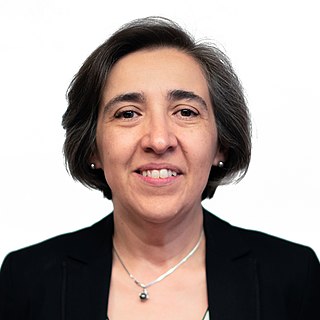
Ana Cecilia Noguez Garrido is a Mexican physicist, professor, and science communicator. A specialist in the interaction of light with matter on a nanometric scale, she won a National Prize for Arts and Sciences in 2016.












